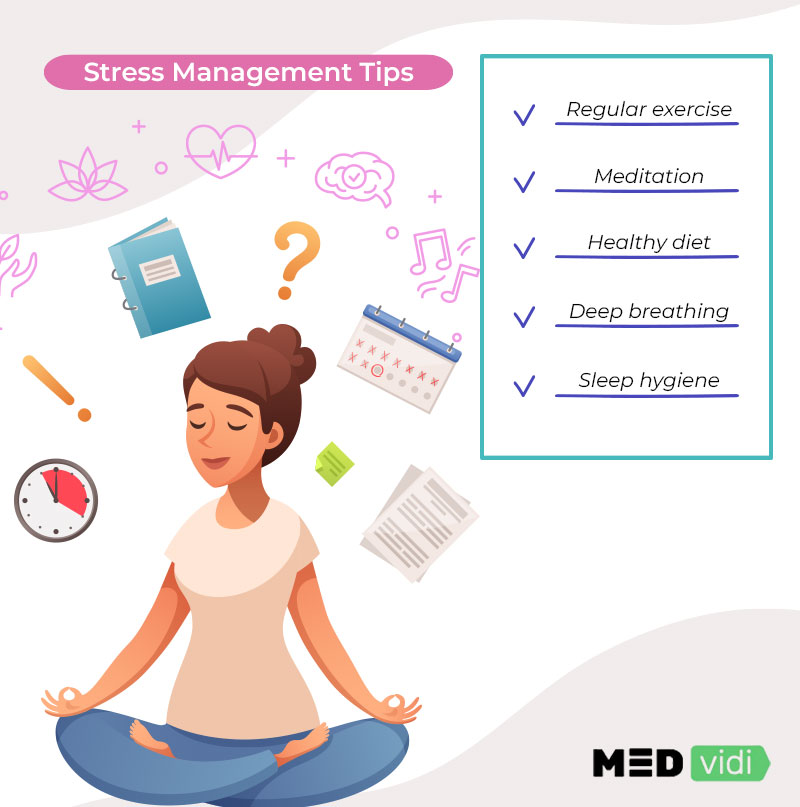Everyone has to deal with stress every now and then. Juggling between work, family, and other responsibilities can be overwhelming. Sometimes, even more serious stressors occur, such as losing a loved one, facing financial difficulties, or getting diagnosed with a chronic illness.
Generally, stress is not all evil. Sometimes, it motivates you to get things done. Thus, feelings of anxiety and cognitive fatigue for a while might be normal. Nevertheless, if you feel anxious and stressed for several weeks or the stress interferes with your functioning, seek professional help promptly.
Psychological therapy, medications, and various coping strategies have shown great efficacy in relieving stress and other mental disorders. In addition, you can implement self-help techniques to boost the efficacy of treatment. Let’s review them below.
Having trouble managing stress? Ask our mental health experts for help.
How to Deal With Stress
While some hardships and worries are inevitable, there are ways of managing stress you can learn. Such strategies help you maintain good mental health regardless of your daily encounters. These include:
- Keeping a positive attitude towards life events or at least being realistic and avoiding catastrophic thinking.
- Acknowledging and accepting that you cannot control everything happening in your life.
- Managing time more effectively and having time for yourself, your interests, and hobbies.
- Setting limits and learning to say no to things that would stress you more.
- Avoiding the use of alcohol, other substances of abuse, or compulsive behaviors as stress alleviators.
- Converting aggressive behaviors into assertion. Instead of feeling angry and defensive, assert your beliefs, opinions, and feelings.
- Strengthening your social relations by spending more time with those you love.
- Seeking advice from a mental health professional such as a psychologist to learn more stress management techniques.
3 Lifestyle Modifications for Stress Reduction
Some stress management skills are simple to implement as they relate to a generally healthy lifestyle. So, you can relieve stress to some extent by using the following tips:
From aerobics and jogging to swimming and cycling, physical activity guarantees a good dose of stress relief. Such stress management activities improve sleep, enhancing one’s ability to manage tension. Typically, people who exercise experience a deeper slow wave sleep than those who don’t. The slow wave phase of sleep is vital in refreshing the body and mind, helping you deal with stress more effectively. But remember, vigorous physical activity before bedtime can interfere with your sleep cycle.
Besides sleep improvement, physical stimulation enhances mood. Exercise causes your body to release chemicals such as endocannabinoids and endorphins. These elements, often referred to as the feel-good hormones, help inhibit and reduce pain and improve sleep. The euphoric feeling that occurs after long runs is attributable to endocannabinoids. Your mind will be at ease if your body feels good. As one way of coping with stress, individuals who exercise tend to be more positive and less anxious than their non-exercising counterparts.
If your schedule does not permit you to engage in common exercise programs like aerobics and jogging, try another way of exercising, such as using the stairs instead of the elevator, going for a lunch break walk, and handwashing your car.
Many people only focus on the physical benefits of eating healthy. However, the benefits extend beyond maintaining a good body mass index to mental health.
From leveling mood to lessening stress, the effects of a balanced diet are significant. Eating healthy builds your immunity and lowers blood pressure, enhancing your ability to steer through stressful events.
While junk food might be appealing when stressed, limit it if you want to win the mental health battle. Instead, eat whole grains, lean proteins, and vitamins. Particular nutrients, omega-3 fatty acids, magnesium, and vitamin C, are important in fighting stress. Be sure you get enough of these minerals in your diet.
Stress often causes sleep disturbances, including difficulty falling or staying asleep. But lack of sleep can also worsen your stress and anxiety. Essentially, this is a vicious cycle that you must break from. Adopting good sleep strategies can help you have restful nights and relieve stress.
Sleep hygiene practices include regular exercise, avoiding stimulants like caffeine before bedtime, setting a sleep schedule, and having a comfortable environment for sleep. A quality mattress and a dark, quiet room are necessary for good sleep.
Sleep fluctuations are a normal consequence of continued or acute stress. MEDvidi doctors know how to treatment for acute stress disorder.
Relaxation Techniques
Deep Breathing
During stressful moments, close your eyes, take a deep breath through your nose and then exhale. Such breathing exercise is one of the best ways to manage stress as it creates a deep rest that alters how your body reacts to stress. Typically, deep breathing sends more oxygen to the brain and causes relaxation.
Meditation
Whether you are struggling with stress, chronic pain, or a mood disorder, meditation will give you relief. When stressed, find a quiet place, assume a comfortable posture, and focus your attention on a single object or phrase while letting your thoughts run without judging them.

Yoga
The benefits of yoga vary widely. You can focus on stretching, deep breathing, and slow movement to reduce stress and keep fit. Try different yoga types to know which brings you both physical and emotional value.
For some people, self-help techniques are not enough. Professional help can bring the desired relief, consult a doctor today!
Biofeedback for Stress Management
With the help of a biofeedback therapist, you can learn how to manage stress and anxiety by taking control of your body’s reaction to stress. The therapy involves installing a sensor that detects changes in heart rate, blood pressure, or muscle tension during stressful times. The biofeedback psychologist will help you develop mechanisms of keeping signals within normal range despite circumstances.
In Summary
Every day we encounter stressful moments. But stress can be disabling if it interferes with your physical, cognitive, and social functioning. Relaxation techniques, lifestyle modifications, and biofeedback therapy are some strategies you can employ to prevent exacerbation of stress. Sometimes, the symptoms of stress indicate mental health issues, so don’t hesitate to contact MEDvidi doctors, who can examine your symptoms and offer professional help.



